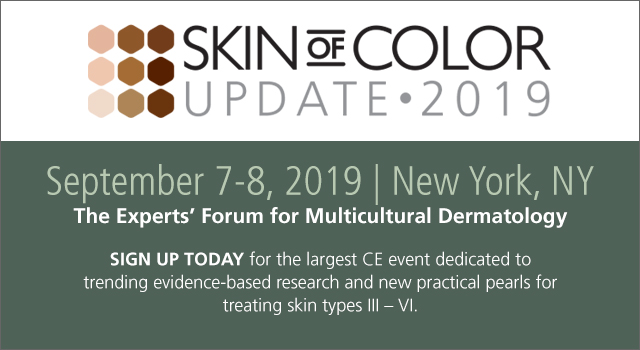Natural Cosmeceutical Ingredients for Hyperpigmentation
JDD peer-reviewed manuscript by Noelani Gonzalez MD and Maritza Perez MD
January 2016 | Volume 15 | Issue 1 | Original Article | 26 | Copyright © 2016
As a young dermatologist, why is this article important?
Natural ingredients are becoming more popular in the world of dermatology. New practitioners will most likely have patients who are going to ask about natural options to treat their skin concerns. Or who will bring in their own cosmeceuticals and inquire about their effectiveness. This article precisely reviews just that, and gives various options to chose from in regards to treating hyperpigmentation.
As a resident, why is this article important?
This article is a good review of the melanogenesis pathway and goes over many natural treatment options. And where they fit in on this pathway, which steps they affect or modify, so you can apply basic science, clinical, and pharmacologic knowledge at the same time.
What was the impetus for writing an article on this topic?
Dr. Perez and I are both from Puerto Rico, and I am currently training in NYC, so we’ve been constantly exposed to skin of color patients. Hyperpigmentation is a common concern in these patients and topical treatments to date are still limited. We thought it would be interesting and educational to think outside the box and discuss natural treatment options that could benefit these patients.
Are the safety concerns around traditional depigmenting agents something that is widely acknowledged by most dermatologists?
Knowing the risks and benefits about the medications we prescribe is an integral part of being a good dermatologist, and is something that should always be discussed with patients prior to prescribing any medication. In my opinion most dermatologists are aware of safety concerns of traditional depigmenting agents such as hydroquinone and retinoids. That being said ochronosis can be a consequence of overuse of hydroquinone, which in my opinion tends to be under recognized.
In your opinion, are non-prescription natural alternatives becoming more commonplace/popular when treating hyperpigmentation?
I believe there are more and more patients who are looking for new “natural and organic alternatives” for treatment of their skin conditions. So this article describes various options that can be considered when treating hyperpigmentation. As either adjuncts to well established treatments or can be tried on their own for those patients who are resistant to use anything that is not natural.
Is there anything you would like people to know on this topic that is not relayed in the article?
Yes. Many times patients with hyperpigmentation come to us and we prescribe traditional agents hoping that they’ll get better. But this is usually something that affects their appearance and self-esteem. Since most of these patients present with hyperpigmentation on very visible areas such as their face. Therefore, we should really try to do our best for these patients, and understand that although this isn’t something life threatening or as disfiguring as other skin conditions. It does affect their image and we should do everything we can to help them.
Read the JDD article here: http://jddonline.com/articles/dermatology/S1545961616P0026X/1


